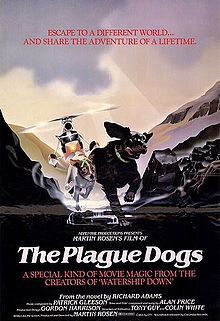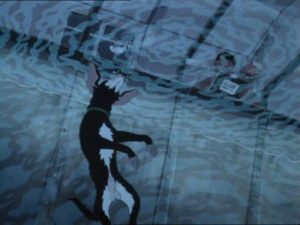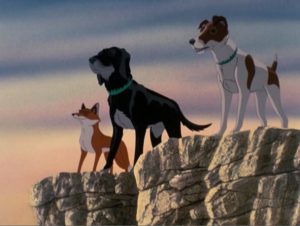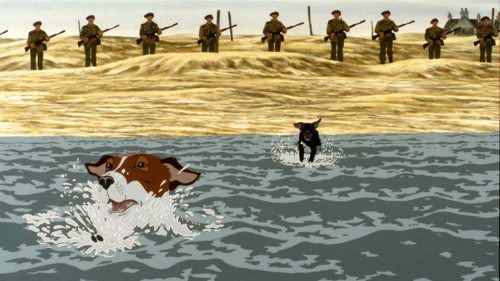 The Plague Dogs (’83) is so bleak, dark, and disturbing I can hardly believe it exists. An animated tale of talking dogs, The Plague Dogs is decidedly not for kids. I know any number of adults whose psyches it would destroy. It’s written and directed by Martin Rosen, based on the novel by Richard Adams, whose earlier novel, Watership Down, Rosen also adapted for the screen (to rather poor effect, I’m afraid). I’ve never read The Plague Dogs, so I don’t know what was lost in translation, but in a twist hitherto unknown in the annals of film, Rosen got rid of the book’s happy ending and replaced it with one we might call “uncertain,” if not “profoundly sad.” In fact the movie’s ending matches the one Adams originally wrote before his editors convinced him to lighten things up prior to publication.
The Plague Dogs (’83) is so bleak, dark, and disturbing I can hardly believe it exists. An animated tale of talking dogs, The Plague Dogs is decidedly not for kids. I know any number of adults whose psyches it would destroy. It’s written and directed by Martin Rosen, based on the novel by Richard Adams, whose earlier novel, Watership Down, Rosen also adapted for the screen (to rather poor effect, I’m afraid). I’ve never read The Plague Dogs, so I don’t know what was lost in translation, but in a twist hitherto unknown in the annals of film, Rosen got rid of the book’s happy ending and replaced it with one we might call “uncertain,” if not “profoundly sad.” In fact the movie’s ending matches the one Adams originally wrote before his editors convinced him to lighten things up prior to publication.
The film opens with an adorable Labrador, Rowf (voiced by Christopher Benjamin), being experimentally drowned in an animal research laboratory. But wait, kids! Rowf isn’t dead, the so-called “white-coats” just wanted to see how long Rowf could tread water in a tank until he gave up and died. Like they’ve done many, many times before, leaving Rowf a cowardly, shaking mess.
Soon, Rowf is convinced to escape by a delightful fox terrier, Snitter (John Hurt), whose shaved, scarred, bandaged skull is the result of his brain having been recently operated on (“The flies in my head! They keep buzzing…”). Poor Snitter’s having a bit of trouble telling reality from his dreams these days. You might say he’s the Fiver of the story. But he nevertheless leads Rowf past the caged rats, the dead-eyed rabbits, the chained monkeys with electrodes attached to their brains, through the bloody incinerator, and away to freedom in the hills of northern England.
Though this is a talking animals movie, the animals aren’t anthropomorphized in anything but speech. The dogs behave like dogs, running, hiding, sniffing, pissing. They’re starving in the hills until they meet The Tod (James Bolam), a sly fox with a thick accent, who helps them find, trap, and kill some local sheep, despite being dirty bastard only out for himself.
Problem is, farmers hate it when you murder and eat their precious sheep, and when rumors spread of dogs missing from the creepy local lab, fueled by further rumors that those dogs are carrying bubonic plague, the guns come out.
That’s about it, storywise. This is a tale of escape and survival, and of friendship, too, between Rowf and Snitter. Rosen claims the movie isn’t about sending a message on the crime of experimental animal vivisection, but holy god, I can’t see how anyone could watch this movie and not weep at the sight of these abused and imprisoned lab animals. Every time the movie cuts to the facility, we see a particular monkey trapped in a metal vat, twitching in its isolated insanity.
Humans are given voice in The Plague Dogs, but we never see them speaking. In fact we rarely see them above the knee, if at all. We’re with the animals, seeing the ghastly world of man from their perspective. It ain’t pretty. The Plague Dogs offers none of the life lessons we’ve come to expect in our animated kids’ movies. If there’s any message here, it’s that humans are bastards to be avoided at all cost.
Did I like it? I’m the fence. It’s not a warm movie in any way whatsoever. I’m not sure what to take away from it. It’s unusual, at least. I’m glad to have finally checked it out (I have very vague memories of its existence as a kid). I might read the book. But this movie. It’s liable to leave you on your knees, pounding your fists into the earth, shouting at an uncaring sky, “Why, you bastards?! WHY?!” Take a look, if you dare.




What with Richard Adams, RIP, on my mind of late, thought I’d stop by here to mention that I’ve since read the novel, The Plague Dogs, and found it to be almost as good as Watership Down. So, like Watership Down, you’re best off skipping the movie version and reading the book. Or at the very least, read the book first, then see how you like the movie afterwards.
I’m glad that through internet research I’ve seen that Richard Adams’ stories have messed others up as well as myself. I have never read or seen the Plague Dogs and I honestly don’t know if I can. Anytime I think about Watership Down I feel like I might just die due to the weight it seems to put on my chest.
I don’t know what it is… I’m trying to get past the cruel parts and focus on the tale of life and adventure and friendship and bravery and I really LOVED the book. I did. It just all seems to come back to humans being the worst possible thing to ever evolve on this planet and Adams has me questioning everything – where does evil come from? Would other species be this cruel if they had evolved as far as we have? If they had the means to be? Because the very core, primitive feeling of evil lurks in the shadows of his stories and I can’t shake it. And I can’t stop thinking about how it’s so very very true.
Adams doesn’t pull any punches, it’s true. Well said. But if you can get past the horrible humanity on display, The Plague Dogs is a wonderful book, if not quite the magical masterpiece that is Watership Down.
Thank you, Molly, your words resonate with me deeply. I couldn’t have put it any better. Having been involved in rescuing dogs for the past 30 years and having seen firsthand what happens to animals in research labs and factory farms, I have witnessed the heartbreaking truth of human cruelty at its worst. Someone gave me the book, The Plague Dogs, and just reading the beginning, broke my heart; and, like you, I can’t shake it..I think many humans are basically greedy and when that greed is the prime moving force, that’s when cruelty becomes the norm. But I continue to do what I can for the victims.
The darkest animated film ever.